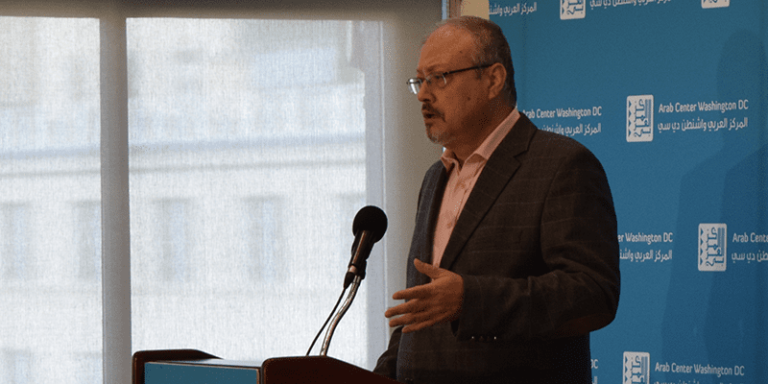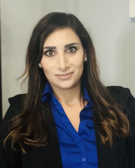
In 2018, the number of journalists worldwide killed on the job nearly doubled, according to a new report by the Committee to Protect Journalists. The brutal and premeditated murder of Washington Post journalist and Saudi activist Jamal Khashoggi was probably the most prominent case, one that has shed light on the dangers facing journalists around the world as well as on the increasing threats to press freedoms, particularly in the Arab world.
As Time Magazine’s choice for Person of the Year denotes, numerous journalists around the world pay the ultimate price for their work as they search for the truth and inform the public. Reports show that 53 journalists were killed in 2018, including 13 in Afghanistan, nine in Syria, three in Yemen, and two Palestinians murdered by Israeli soldiers during the protests in Gaza. Journalists have also been killed in reprisal for their work in Slovakia, Bulgaria, Malta, Mexico, and Brazil, among other places. Additionally, 251 journalists were imprisoned around the globe in 2018, with Turkey topping the list for the third consecutive year as the world’s largest jailer of journalists (at 68) and Egypt imprisoning a record number. As journalists face a global increase in verbal and physical attacks, only 13 percent of people around the world live in countries where they enjoy freedom of the press, which is a human right and a necessary ingredient for accountability and democratic governance.
Evidently, Khashoggi is not alone, and his gruesome murder and silencing will not mark the end of brutal attacks on journalism and freedom of expression. Attempts to delegitimize the press, rampant social media clampdowns, and increased authoritarian tendencies and autocratic alliances all wear down the causes of truth and human rights.
Delegitimizing the Press
Jamal Khashoggi’s murder in the Saudi consulate in Istanbul marks a pivotal moment in the global order. It shows that authoritarian leaders, such as those in Saudi Arabia, can literally get away with murder, silencing dissent at home and abroad with impunity. Most notable has been the response by the Trump Administration, which chose to prioritize trade and countering Iran over human rights and political accountability. Despite CIA conclusions implicating Saudi Crown Prince and de facto ruler Mohammed bin Salman (MBS) in the killing, President Trump has consistently been evasive regarding blaming the crown prince and taking any action against the kingdom.
The statement by the White House failed to mention Khashoggi’s role at the Washington Post; remarkably, it reiterated the Saudi official narrative that the journalist was an “enemy of the state.” Not surprisingly, Trump has displayed no concern for freedom of the press and protection of journalists. In fact, the president himself is known for his attacks against the media, which he called “the true enemy of the people” on the day that a bomb was sent to CNN.
The United States has traditionally been the global defender of human rights and freedom of the press, articulated in the US constitution. However, the most vocal head of state in the case of the slain journalist has been Turkish President Recep Tayyip Erdoğan—also known as the world’s biggest jailer of journalists. This lack of international leadership and the environment of impunity will only perpetuate further violence and repression against journalists, and it will embolden authoritarian regimes around the world to silence critical voices and perpetrate violations of press freedoms and human rights. The growing global trends of delegitimizing the press are dangerous not only for the lives and safety of journalists, but also for the foundations of democracy. Indeed, the rights-based international order is clearly disintegrating.
New Authoritarian Alliances
The global decline in freedom of the press has been matched with a steady increase in strongman politics. From Saudi Arabia, Egypt, and Turkey to Russia, Hungary, and Brazil, attempts to throttle opposition and silence criticism have grown more repressive. The rise of populism and anti-globalism has contributed to erosion of the international rights system, with governments moving away from accountability and transparency.
The current environment has fostered new authoritarian alliances based on shared interests. MBS, the Israeli Prime Minister Benjamin Netanyahu’s government, and the Trump Administration have forged a populist alliance of shared disregard for truth, rights, freedoms, and international law and order, with the overarching quest to curb Iran’s influence. Secret meetings between Saudi Arabia and Israel have taken place since Trump took office in late 2016; they intensified when MBS became crown prince. Netanyahu came out in support of Saudi Arabia after the Khashoggi killing and urged the White House to maintain its support of MBS.
As such, this military, security, and intelligence cooperation, facilitated by the United States, is likely to heighten the abuses against press freedom. In fact, NSO Group, an Israeli company, provided hacked messages from Khashoggi to Saudi Arabia before the brutal murder. Recently, Saudi Arabia started issuing special waivers allowing Israeli businessmen to enter the kingdom without showing Israeli passports. Surveillance technology to monitor and crack down on critics constitutes one of the primary business deals under discussion. As is often the case, freedoms and rights are the most immediate casualties.
Same Autocratic Regimes, New Ways of Repression
Despite earlier predictions by cyber-optimists, developments in the field of information technology do not necessarily expand the opportunities for expression that new media tools potentially afford. In fact, new tools of expression have brought new methods of censorship, pushing press freedom into a decline. Authoritarian rulers continue to practice traditional and direct means of censorship; examples include blocking websites and services in Saudi Arabia and Turkey, shutting down the Internet that serves marginalized groups in Bahrain, and generally removing objectionable content and blocking critical voices from the Web. Further measures have been employed to target and silence activists through their social media accounts and to stifle dissent using new media tools.
While the media ecosystem is rapidly evolving, the power structures and systems of privilege that govern it have not changed. Laws that restrict freedom of the press and criminalize expression both offline and online remain in place. In the Middle East in particular, 2018 saw an upsurge in these tactics, with the region ranking at the bottom of the World Press Freedom Index by Reporters Without Borders. Egypt, Bahrain, Saudi Arabia, Turkey, and Israel are known to use the pretext of terrorism charges to mask crackdowns on journalists and activists.
Perhaps more alarming are the more insidious means of suppression. Authoritarian regimes can essentially undermine the press’s ability to do its job by controlling the public sphere; to be sure, campaigns of disinformation, in combination with accusations of “fake news” against critical press outlets, stifle citizens’ ability to assess the credibility of information. The nature of social media sharing magnifies the power of spreading false information by state actors for political gain. Prominent examples include Russian interference in the 2016 US presidential elections and the Saudi Twitter armies disseminating “industrial scale propaganda” against opponents and critics. The hostile and intimidating environment of attacks against the press, legitimized by president Trump and members of his administration who claim that the media pushes fake news, has been readily adopted and repeated by authoritarian leaders in the Arab world such as Bashar al-Assad. Other methods have included delegitimizing media institutions and the rights organizations that protect press freedoms, much like the NGO law in Egypt.
Press freedom is the litmus test for democracy. Khashoggi’s murder and the absence of freedoms of expression and public discourse in the Arab world highlight the dire state of democracy in the region. Freedom of the press is the most basic tenet in the road to a functioning democracy; to that end, the Arab world needs legal frameworks to protect journalists, transparent media and government institutions, and safe spaces for expression and debate.

